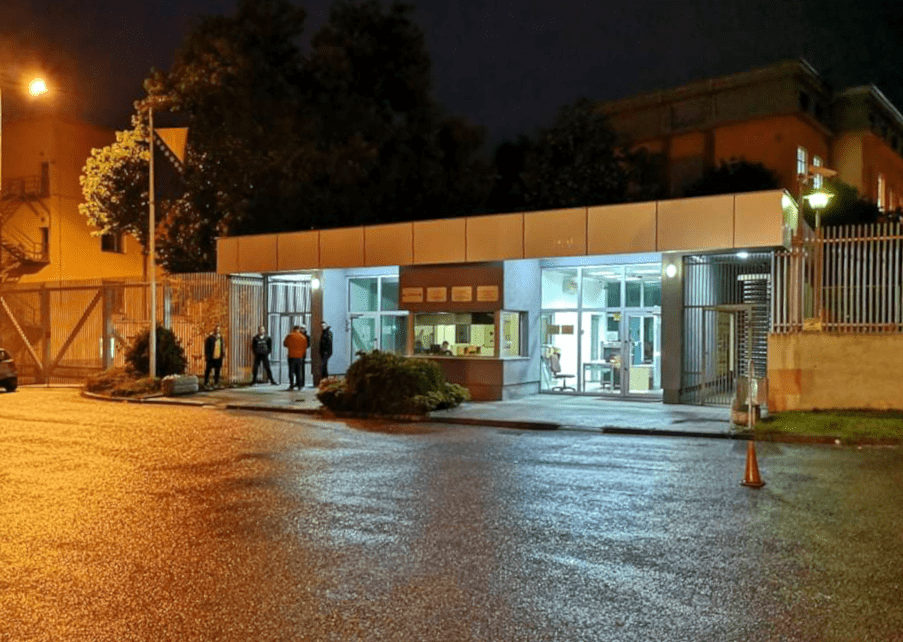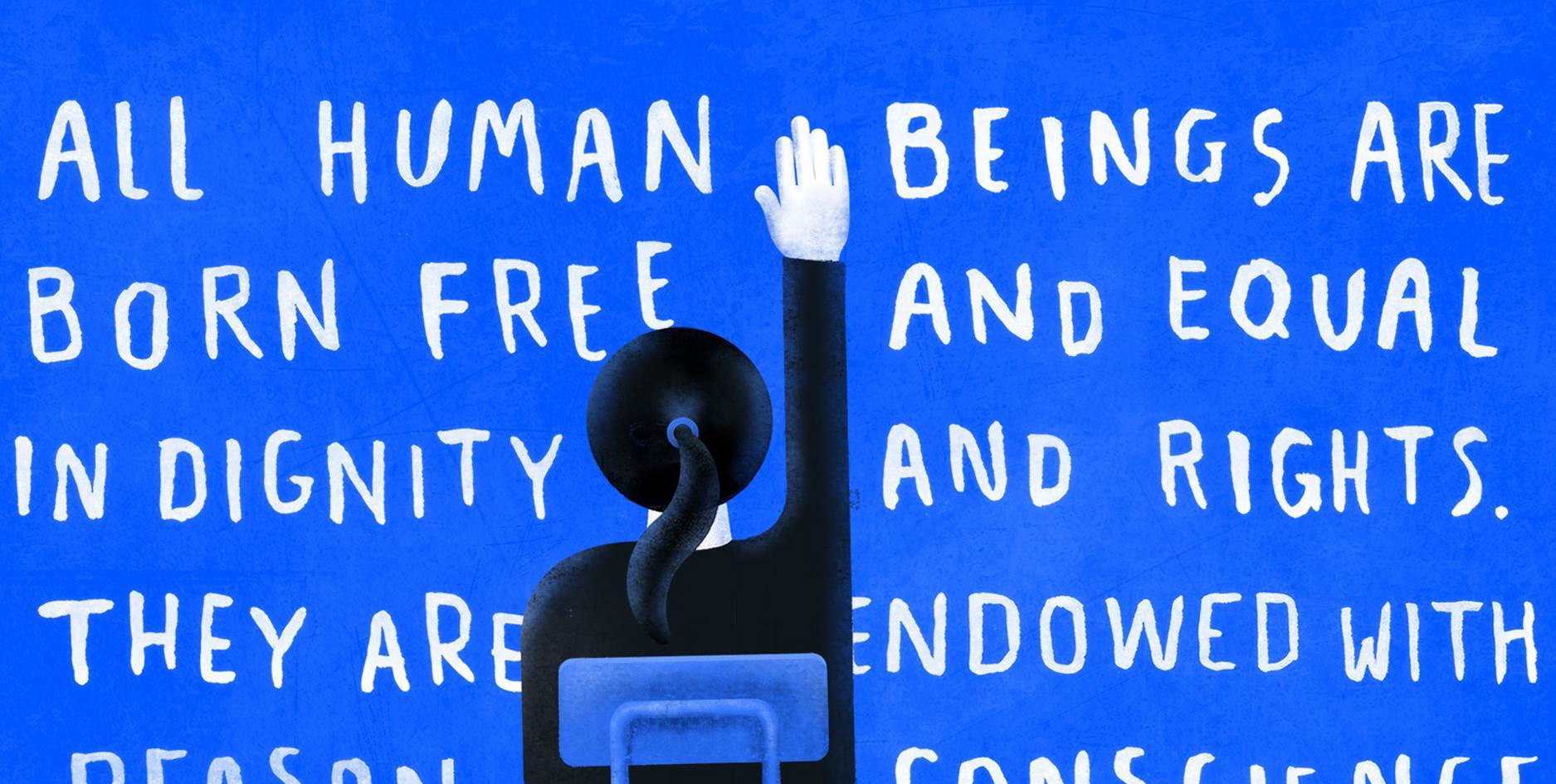This post is also available in: Bosnian
The aim of the podcasts was to occupy the field of debate, to assert far-right political concepts via populist strategies. The commentary was lively, but not bothered about identifying solutions; the aim was to stretch the limits of normal communication and create new ways of being politically engaged.
‘Who we are’

ZA lawmaker takes a picture as he votes ‘yes’ during the parliamentary session in the Parliament building in Skopje, Republic of North Macedonia, 16 July 2022. Photo: EPA-EFE/GEORGI LICOVSKI
The iconography of these podcasts did not differ greatly from the iconography of a right-wing political party, or so-called patriotic rallies and gatherings on various occasions. The flag of the Vergina Sun – removed from public use in North Macedonia under the 2018 Prespa Agreement with Greece – was usually the central insignia.
Some of the podcasts were inclusive and allowed all interested and concerned parties to comment and participate live – a parody of democracy that appeared to take the opinions of others into account even when diametrically opposed to those of the authors.
Besides the iconography, another central element of these podcasts was their insistence on national as the basis on which to contemplate reality and act within it.
The national subject, which is the cornerstone of all forms of right-wing political action in North Macedonia, drew on traditional narratives of “who we are” and “where we come from”, with minor interventions concerning the role of ASNOM (the Anti-fascist Assembly for the National Liberation of Macedonia) and Yugoslavia, as well as the historical role the federation played in the creation of North Macedonia.
In fact, although the national myth and the new national narratives installed with the ‘Skopje 2014’ project – a kitsch and much-criticised makeover of the capital by then nationalist authorities – were not discussed in full, the already established historical ‘groove’ was accepted as the lens through which the history of ‘Macedonia’ was perceived and interpreted.
The agreements with Bulgaria and Greece were a point of frustration as well as awakening for Macedonians. They were a historical necessity that had to be accepted with a dose of historical sacrifice. In the same vein, those who had allowed for the signing of these, and which had inflicted such national humiliation, were branded traitors. According to these far right proponents, they betrayed not only the nation and its history, but also the Macedonian identity.
Another element, which has been a fixture of traditional right-wing discourse, is the relationship with the ethnic Albanian minority.
The agreement with Bulgaria and Greece, the change of name to ‘North Macedonia’, and the negotiations with Sofia over language and history were viewed as disastrous, but it’s the Albanians who have always been perceived by the far-right as the internal enemy, always there and engaged with on a daily basis, a constant source of frustration.
Besides the frustration caused by the very physical presence of Albanians within the borders of North Macedonia, the far-right has pursued a narrative that Albanians actually own the state; Macedonians may have given away their identity, language and history to Greece and Bulgaria, but they gave away their state to the Albanians with the 2001 Ohrid Framework Agreement that ended months of clashes between government security forces and ethnic Albanian guerrillas.
The Macedonian far right longs for the dissolution of this agreement and for a final reckoning in the shape of a second-round grudge match. These channels broadcasted debates that often reiterated this loss of the monopoly over the state and its institutions; this loss removed all possibility of enforcing and imposing any kind of ideology.
Libertarian
A Supporter of the opposition party VMRO DPMNE holds a sign during a protest against the French proposal to resolve the dispute between North Macedonia and Bulgaria in front of the Parliament building in Skopje, Republic of North Macedonia, 07 July 2022. Photo: EPA-EFE/GEORGI LICOVSKI
In addition to the podcasts, a long-running forum was also analysed.
In this forum, the building of the notion of the Macedonian nation was also heavily dependent on the Albanians, portrayed within the nativist national concepts promoted on this forum as new arrivals to the territory of North Macedonia and consequently holding a lower rank than Macedonians when it comes to historical status. Some far right promoters claimed that the Albanians have received more than they deserved, while some supported their theses with racist definitions and para-anthropological classifications and analyses. We can conclude that the Macedonian far right is mono-ethno-nationalistic.
What we can identify as a novel characteristic of the Macedonian far right are their ideas about the economy, which follow a libertarian logic that promotes the free market as one of the elements that corresponds with the values of democracy.
In actual fact, the far right promotes democracy only as a value related to the freedom of the individual, not as a system in which the individual is obliged to contribute and compromise.
The free market and its struggles are perceived as the freedom to run for elections and as a victory of the better offer. The critique of the economic, social and educational system by the far right was mainly focused on the remnants of the old Yugoslav socialist system that still caused problems in the understanding of the economy and the market and which, according to its proponents, in the context of North Macedonia, should be free in order to help purge the society and its institutions of ghosts of the past.
An important component was the attitude of the far right toward the pandemic and the health policies implemented during the pandemic period, including the strict protocols introduced by the state in order to prevent the spreading of the virus.
One of the analysed podcasts functions at the same time as the newsletter of a political party that organised protests between 2020 and 2022 against anti-COVID measures. Their initiative followed two paths – the first was their podcast on YouTube, the second was the street, where they organised protests against mask-wearing and the possibility of mandatory vaccination.
Both should be optional, this group argued, while some of its claims could be classified as conspiracy theories.
Mariglen Demiri is a researcher at Eurothink -Center for European Strategies since July 2021. He is a founder and member of many political movements and organizations such as Lenka, Solidarnost, Student Plenum and Protestiram.
The opinions expressed are those of the author and do not necessarily reflect the views of BIRN.



